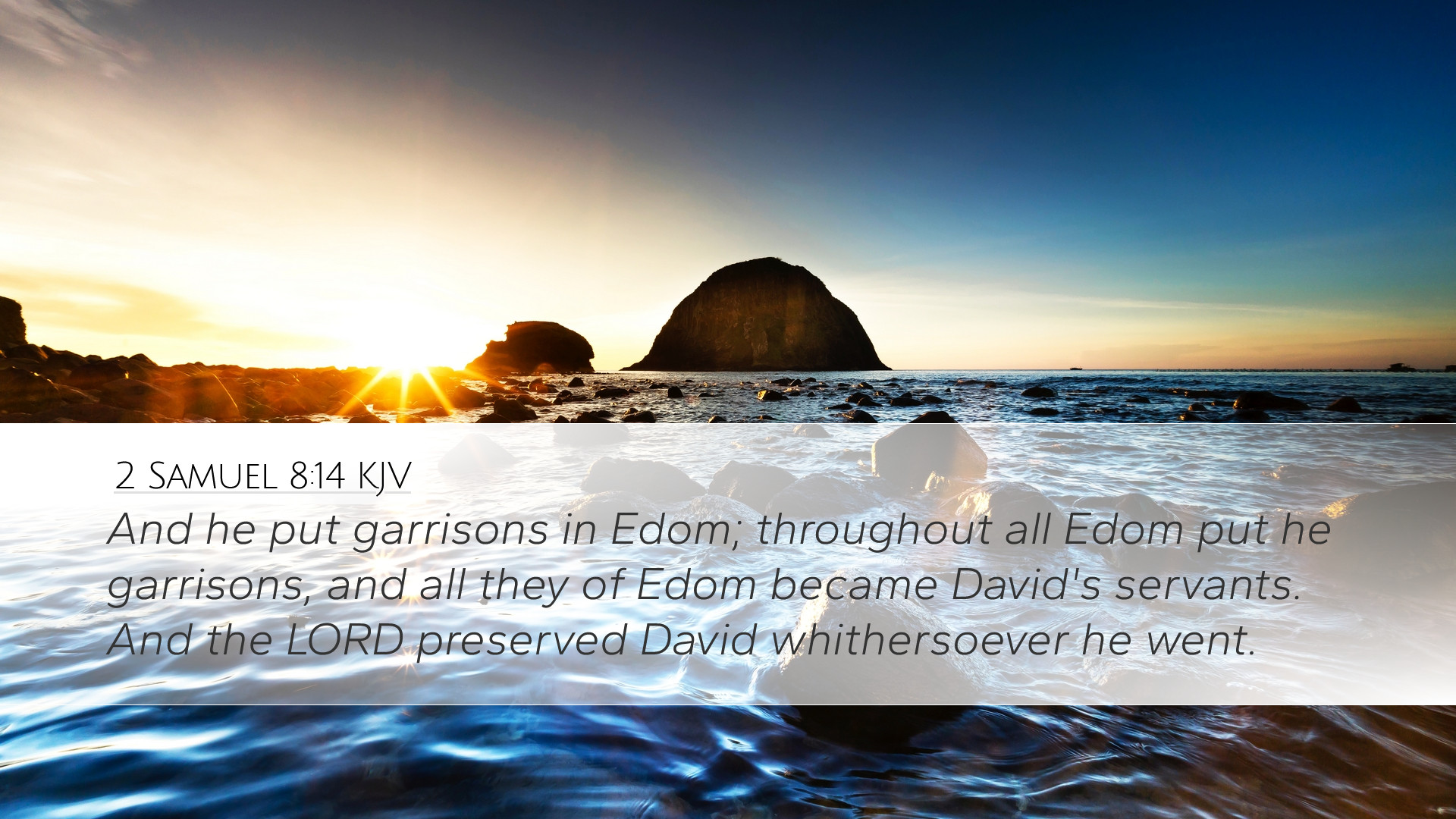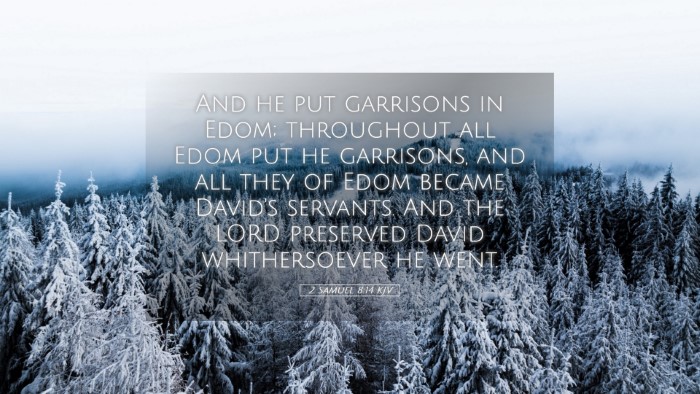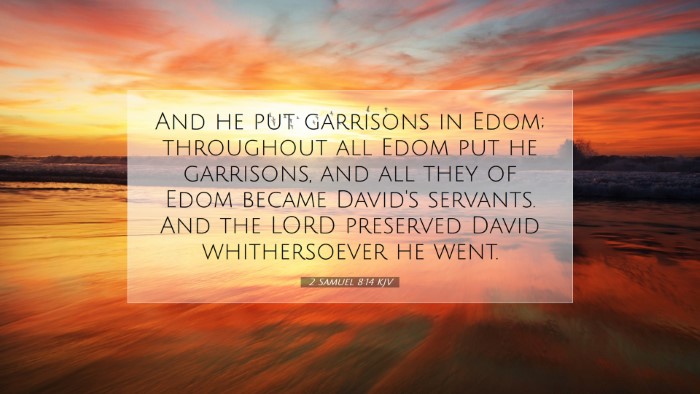Old Testament
Genesis Exodus Leviticus Numbers Deuteronomy Joshua Judges Ruth 1 Samuel 2 Samuel 1 Kings 2 Kings 1 Chronicles 2 Chronicles Ezra Nehemiah Esther Job Psalms Proverbs Ecclesiastes Song of Solomon Isaiah Jeremiah Lamentations Ezekiel Daniel Hosea Joel Amos Obadiah Jonah Micah Nahum Habakkuk Zephaniah Haggai Zechariah Malachi2 Samuel 8:14
2 Samuel 8:14 KJV
And he put garrisons in Edom; throughout all Edom put he garrisons, and all they of Edom became David's servants. And the LORD preserved David whithersoever he went.
2 Samuel 8:14 Bible Commentary
Commentary on 2 Samuel 8:14
2 Samuel 8:14 states: "And he put garrisons in Edom; throughout all Edom put he garrisons, and all they of Edom became David's servants. And the LORD preserved David whithersoever he went."
Introduction
This verse encapsulates a critical moment in King David's reign, reflecting his military successes and God's favor. It highlights the establishment of control over Edom and signifies the expansion of David’s kingdom and influence. The insights derived from Matthew Henry, Albert Barnes, and Adam Clarke offer a rich theological understanding of the implications of this text.
Military Strategy and Control
David's strategic establishment of garrisons in Edom represents more than mere military action. It shows a comprehensive approach to governance and control:
- Matthew Henry: Emphasizes that the presence of garrisons served to solidify David's dominance over Edom, transforming conquered territories into controlled provinces. He implies that this shows David's skillful leadership in ensuring peace and security through military presence.
- Albert Barnes: Points out the importance of military installations in preventing rebellion and ensuring stability. He remarks that this act not only secured David’s reign but also transformed Edom from a hostile territory into an integral part of his kingdom.
- Adam Clarke: Highlights the political significance of these garrisons, suggesting that they were indicative of David’s overall strategy to establish a unified and secure kingdom. Clarke underscores that military might must be accompanied by wise governance.
Theological Implications of God's Favor
This verse also reveals a profound theological truth regarding divine favor and providence. The second part of the verse states that “the LORD preserved David whithersoever he went,” which denotes:
- Matthew Henry: Interprets this preservation as a sign of God's continuous guidance in David's life, emphasizing that David's military successes were not merely the result of human strategy but were undergirded by divine endorsement.
- Albert Barnes: Affirms that God’s favor is a vital component of successful leadership and military campaigns. He argues that David’s victories are clear indicators of God’s blessing on his leadership, which serves as a lesson for contemporary leaders.
- Adam Clarke: Further elaborates on this divine preservation as a covenantal promise. Clarke asserts that David's faithfulness to God and reliance on divine assistance were paramount, marking a significant contrast to those who pursue power without regard to divine sovereignty.
The Role of Servitude in David's Kingdom
The text concludes with the statement that all the people of Edom became David’s servants. This transition from adversary to servant is significant in understanding David's diplomatic and military strategies:
- Matthew Henry: Observes that this servitude signifies not only conquest but also a transformation of relationships. It indicates that former enemies can become loyal subjects, reflecting the broader theme of redemption inherent in God's workings.
- Albert Barnes: Notes that servitude in this context can be understood as both a physical and spiritual allegiance to God’s anointed king. This servitude illustrates the benefits of aligning with God’s covenant people, a lesson for modern-day believers about the necessity of submitting to God’s authority.
- Adam Clarke: Points out the importance of mercy in victory. He argues that David's approach was more than military; it was also about incorporating these peoples into the broader narrative of God’s plan, linking their servitude to the fulfillment of divine prophecy.
Lessons for Contemporary Leadership
From David's actions in this passage, modern leaders can glean vital lessons:
- Strategic Planning: The necessity of wise strategy in governance and military affairs remains relevant. Leaders are encouraged to think critically about how they exert control and influence.
- Divine Favor: The importance of seeking divine guidance and favor in all endeavors is emphasized. Leaders must recognize that true success comes from aligning their purposes with God's will.
- Transformational Relationships: The concept of turning enemies into allies remains pertinent today; it underscores the need for reconciliation and peacebuilding in leadership.
Conclusion
2 Samuel 8:14 is a rich verse that reflects on David's military prowess and the divine favor that accompanied his reign. Insights from various commentaries enhance our understanding of the implications of military governance, divine providence, and the nature of servitude in a kingdom under God’s authority. For pastors, students, theologians, and biblical scholars, this verse serves as a reminder of the intersection between divine sovereignty and human agency in the unfolding narrative of God's people.


